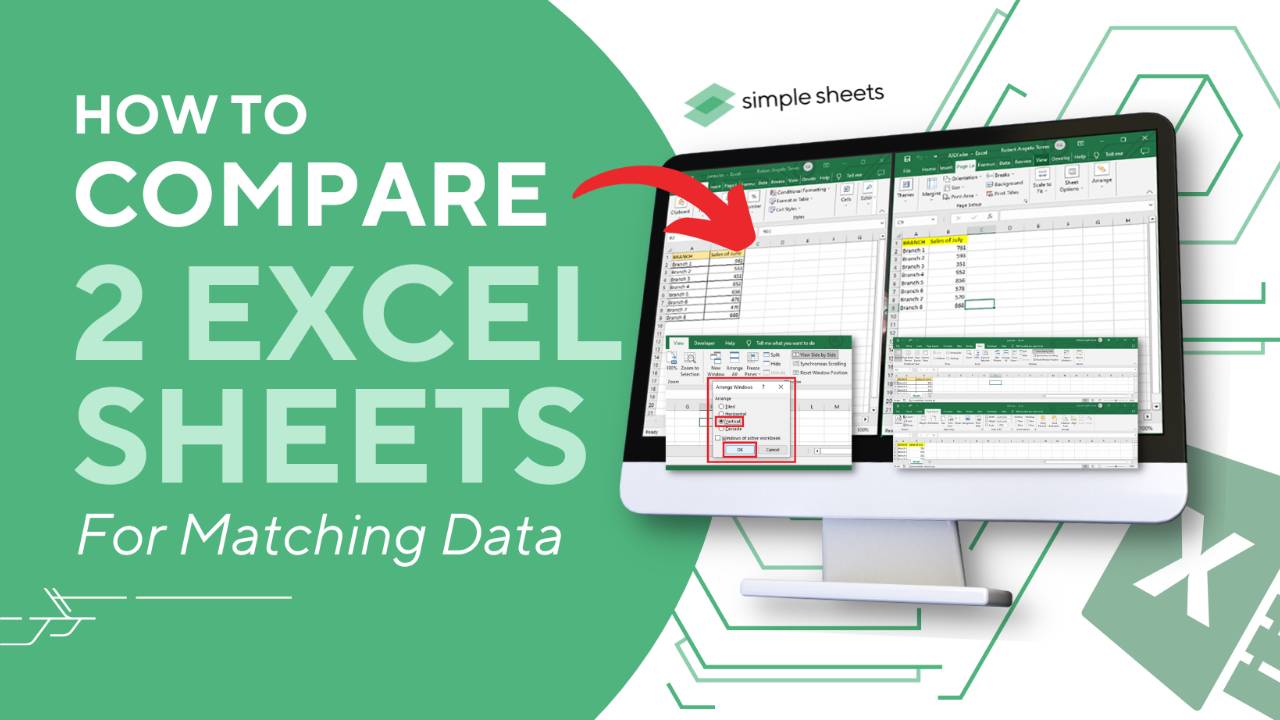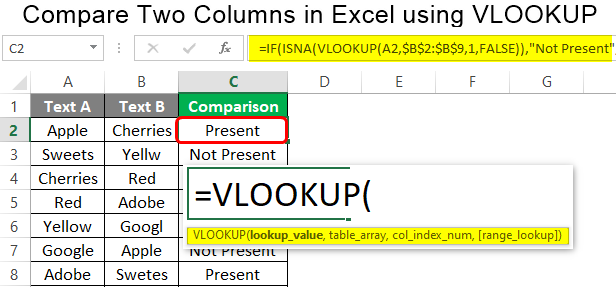Excel Tips: Comparing Two Sheets Made Easy

Comparing data in two different Excel sheets is a common task in data analysis and management. Whether you are tracking changes, consolidating reports, or just managing large datasets, knowing how to compare sheets effectively can save you time and reduce errors. In this post, we'll dive deep into various methods to compare two sheets in Excel, including using built-in features, add-ins, and some lesser-known tricks to make your workflow smoother.
Using Excel’s Built-in Features

Excel offers several built-in functions and features that can help in comparing data from two sheets:
1. Conditional Formatting

- Select the range in one sheet you want to compare.
- Go to Home > Conditional Formatting > New Rule.
- Choose “Use a formula to determine which cells to format.”
- Type in a formula like
=A1<>'[Workbook]Sheet2'!A1if you want to compare cell A1 in Sheet1 with cell A1 in Sheet2. - Set the format to highlight the differences visually.
💡 Note: This method works best for comparing columns or rows side by side.
2. VLOOKUP or INDEX/MATCH

- In one sheet, use =VLOOKUP(A1, Sheet2!A:A, 1, FALSE) to check if the value in cell A1 from Sheet1 exists in column A of Sheet2.
- Or, for a more flexible lookup, use
=INDEX(Sheet2!A:A,MATCH(A1,Sheet2!A:A,0)).
3. Inquire Add-In

If you have Office 365, you might have access to the Inquire Add-In:
- Open the Excel file containing the sheets you want to compare.
- Go to File > Options > Add-Ins, click on “COM Add-ins” then “Go.”
- Check “Inquire” and click OK.
- Under the “Inquire” tab, select “Compare” and follow the wizard to compare sheets.
Using Excel Add-Ins for Sheet Comparison

Beyond built-in features, several add-ins can offer advanced comparison:
1. Compare Two Excel Files

This add-in allows for:
- Comparing entire sheets or specific ranges.
- Highlighting differences in format or content.
2. Spreadsheet Compare

Part of the Microsoft Office suite, this tool:
- Offers a side-by-side comparison.
- Can compare worksheets and cell properties.
Automating Sheet Comparison with VBA

For more control, you might want to use VBA (Visual Basic for Applications):
- Press ALT + F11 to open VBA editor.
- Insert a new module and write a macro like this:
Sub CompareSheets()
Dim ws1 As Worksheet, ws2 As Worksheet
Dim lastRow As Long, lastCol As Long
Dim rng1 As Range, rng2 As Range
Dim cell1 As Range, cell2 As Range
Set ws1 = Sheets("Sheet1")
Set ws2 = Sheets("Sheet2")
With ws1
lastRow = .Cells(.Rows.Count, 1).End(xlUp).Row
lastCol = .Cells(1, .Columns.Count).End(xlToLeft).Column
Set rng1 = .Range(.Cells(1, 1), .Cells(lastRow, lastCol))
End With
For Each cell1 In rng1
Set cell2 = ws2.Cells(cell1.Row, cell1.Column)
If cell1.Value <> cell2.Value Then
cell1.Interior.Color = RGB(255, 0, 0)
cell2.Interior.Color = RGB(255, 0, 0)
End If
Next cell1
End Sub
Run this macro to compare the cells in "Sheet1" and "Sheet2", highlighting any differences in red.
🔧 Note: This VBA solution assumes your sheets have identical structures.
Excel Tricks for Quick Comparisons

Here are some lesser-known methods for those quick comparisons:
1. Name Manager for Easy Navigation

- Use Excel’s Name Manager to name ranges in both sheets, then refer to these names for easy comparison.
2. Quick Search Feature

- Type the value you’re looking for in the Find & Select tool in the Home tab, which is useful for manual or small-scale comparisons.
3. Pivot Table for Comparison

- Create a pivot table that includes data from both sheets, making it easier to spot discrepancies.
Tips for Efficient Sheet Comparison

Here are some additional tips for when comparing sheets:
- Sort Data: Sorting data first can streamline the comparison process.
- Watch Formulas: Keep an eye on any formulas; changes might not be obvious but can have significant impacts.
- Use Tables: Convert ranges to Excel Tables for easier referencing and comparison.
To recap, comparing sheets in Excel can be done efficiently using a variety of methods, from the built-in features like Conditional Formatting and VLOOKUP to advanced techniques like VBA scripting or using specialized add-ins. Each approach has its strengths, suitable for different scenarios or user expertise levels. By mastering these methods, you'll not only enhance your productivity but also ensure accuracy in your data analysis tasks.
Can I compare sheets if they are in different workbooks?

+
Yes, you can compare sheets from different workbooks using methods like VLOOKUP, Excel Add-ins, or manual comparison techniques. The approach would vary depending on your setup and Excel version.
Is there a way to automate the comparison?

+
Absolutely, you can automate the comparison using VBA scripts which can be tailored to your specific needs or by using Excel Add-ins designed for this purpose.
What if the sheets have different formats or structures?
+When sheets have different structures, manual comparison or specialized tools are more effective. You might need to standardize the data first or use tools that can handle varied data structures.



